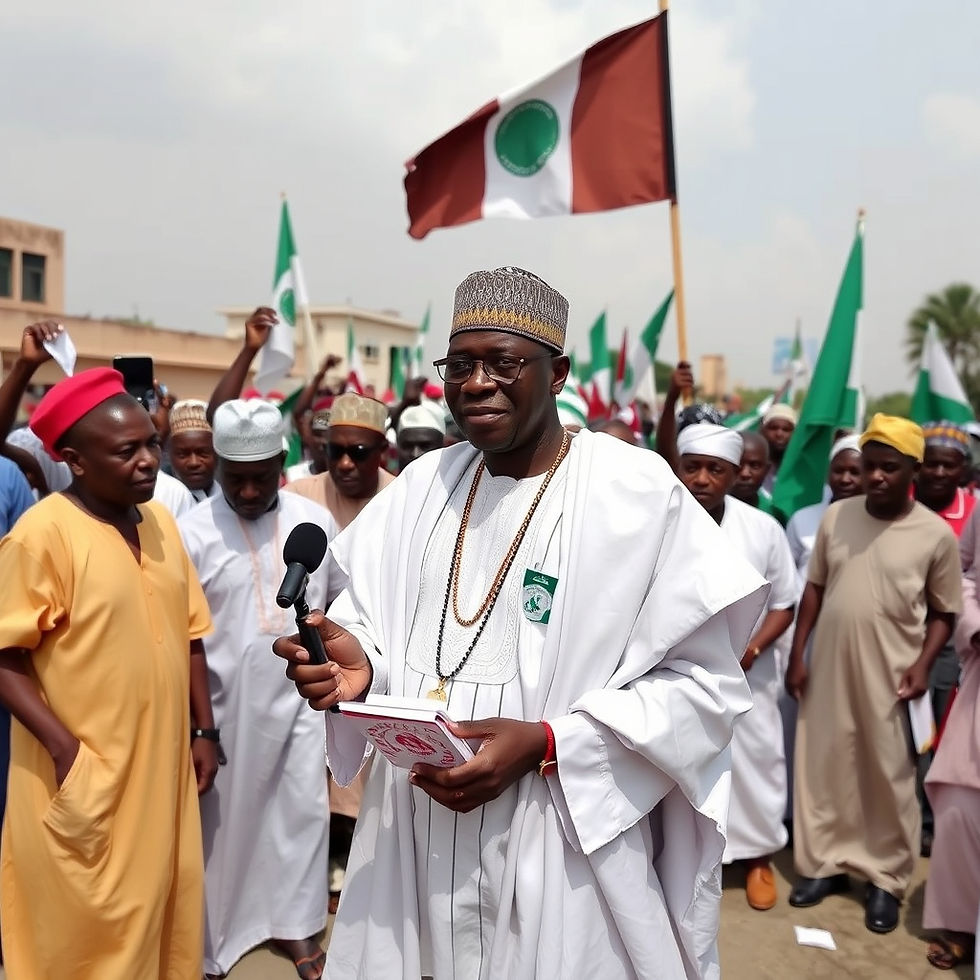Mobilizing 2 Million Nigerians Per State A Path to Nationwide Unity and Growth
- Jun 29, 2025
- 4 min read
Mobilizing 2 million Nigerians in each state is not just an ambitious target; it is a comprehensive strategy to promote national unity, economic growth, and social progress. With a population exceeding 200 million, Nigeria possesses tremendous potential. However, this potential can only be realized through collaborative effort and active participation from all citizens. By prioritizing mobilization at the state level, we can spark a movement that fosters local empowerment and strengthens national ties.
Why Mobilization Matters
Mobilization rallies individuals around a shared purpose. Given Nigeria's diverse ethnicities and cultures, a unified goal can help bridge divides and foster understanding. Engaging citizens meaningfully in governance and community development leads to numerous benefits. For instance, neighborhoods that actively participate in local governance experience 25% higher satisfaction and cooperation rates. This collective effort not only generates creative solutions but also fosters a sense of ownership that nurtures sustainable outcomes for society.
Setting the Stage for Success
Laying the groundwork for mobilizing 2 million Nigerians per state involves collaboration among essential stakeholders. This includes government agencies, grassroots organizations, and community leaders.
Creating awareness about mobilization goals through effective communication is critical. Leveraging local influencers to spread the message ensures it resonates with the audience. Transparency in goal-setting builds trust, increasing community buy-in.
For example, states that engaged local leaders in their campaigns reported a 30% increase in volunteer participation. This demonstrates that harnessing local networks can significantly amplify outreach and impact.
Engaging the Youth
Nigeria's youth population is one of its greatest assets, yet it remains largely untapped. Engaging this demographic is crucial for mobilization success. Offering youths positions of responsibility in various projects can boost engagement and foster a sense of belonging.
To attract this group, initiatives related to sports, technology, and the arts can be particularly effective. For instance, a recent initiative in Lagos that paired technology workshops with entertainment events drew over 15,000 young participants and fostered numerous start-ups in just six months. By providing youth-led platforms tailored to their interests, we empower them to drive community development initiatives.
Inclusion Across Diverse Communities
Nigeria's rich cultural diversity is a double-edged sword; it presents both opportunities and challenges. Ensuring that mobilization efforts are inclusive is vital. Representation from women, children, the elderly, and marginalized groups is necessary for a fair approach.
Programs should aim to understand the unique obstacles faced by different communities. For example, initiatives in rural areas can focus on agricultural training sessions that help farmers increase yields by as much as 50%. By allowing local input, we ensure initiatives are relevant and impactful.
Leveraging Technology for Mobilization
In our digital world, technology is key to effective mobilization. Social media, mobile apps, and online forums can broaden reach and enhance communication.
For example, a recent campaign using WhatsApp groups to coordinate community events in Enugu reached over 100,000 residents and resulted in an increase in community engagement by 40%. Moreover, data analytics can provide insights that guide decision-making and help measure the effectiveness of various initiatives, ensuring resources are utilized optimally.

No One Left Behind: Developing Inclusive Programs
While the goal is to mobilize 2 million Nigerians per state, equity must be a priority. Programs should reach those in rural areas, individuals with disabilities, and people from lower socio-economic backgrounds.
Creating access to education, healthcare, and job opportunities is essential. For example, a partnership with local NGOs in Kano established mobile clinics that served over 10,000 patients in just three months, demonstrating the impact of targeted efforts. These collaborations can ensure vulnerable members of society are included in mobilization.
Measuring Impact and Success
To evaluate the success of mobilization efforts, it is imperative to measure participation rates and the resulting outcomes. Establishing clear success metrics will help gauge the effectiveness of initiatives.
Incorporating feedback mechanisms allows us to collect insights from participants. This data can pinpoint what works, what doesn’t, and why, facilitating continuous improvement. For instance, regions that actively solicited community feedback reduced dropout rates in programs by 60% due to timely adjustments.
Fostering a Culture of Volunteering
Building a volunteering culture is essential for mobilizing 2 million Nigerians per state. Encouraging community involvement fosters a sense of belonging and shared responsibility.
Programs that recognize and reward volunteer contributions are effective. Celebrating local heroes and their achievements motivates others to participate. For example, a recent award ceremony in Abuja recognizing 50 local volunteers increased engagement by 70% in community projects.
Bridging Gaps: The Role of Leadership
Strong leadership is critical to successful mobilization. Community leaders, local officials, and influential individuals can inspire action and guide initiatives.
Training programs aimed at these leaders equip them with the skills needed for effective community engagement. A recent leadership workshop in Ogun State enhanced collaboration among local leaders and resulted in a 35% increase in coordinated community efforts. This shows how empowering leaders can bridge gaps and enhance participation in mobilization initiatives.
A Vision for the Future
Mobilizing 2 million Nigerians per state represents a strategic route to achieving national unity and growth. By fostering inclusivity, utilizing technology, and promoting community engagement with effective leadership, Nigeria can harness its diverse strengths and unlock its potential.
Through our collective efforts, each state can evolve into a hub of innovation, resilience, and resourcefulness. As we work towards this mobilization goal, we can also pave the way for a more united and prosperous Nigeria, where every citizen plays an active role in shaping their communities and the nation.


Comments